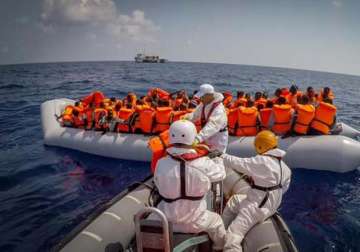Rome: Some 400 migrants have been rescued and 25 bodies recovered after a fishing boat carrying an estimated 600 capsized on Wednesday in the Mediterranean Sea north of Libya, an Italian Coast Guard official said.
Cmdr. Filippo Marini said the rescue operation was still ongoing, involving seven ships. Survivors have indicated that between 400 and 600 people were on board the smugglers' boat when it capsized, he added.
The Irish naval vessel Le Niamh was one of several ships requested by the Italian coast guard to speed to the rescue of the overturned boat shortly before noon, Irish Capt. Donal Gallagher told The Associated Press by phone. "An Italian (military) helicopter has dropped additional life rafts" into the sea, he added.
Also involved in the rescue were an Italian vessel and a boat operated by Doctors Without Borders. Non-governmental organizations often join in migrant sea rescue operations, which are coordinated by Italy's coast guard and are now under the umbrella of a European Union task force known as Triton. The distressed vessel was reported to be 110 kilometers (about 75 miles) northwest of Tripoli, Libya's capital.
Officials have yet to determine what caused the capsizing.
Before Wednesday's capsizing, the International Organization for Migration said nearly 2,000 migrants are believed to have lost their lives at sea since the start of this year. But the exact toll isn't known. In April, a smuggling boat crammed with an estimated 800 migrants overturned, also off Libya's coast, where smugglers operate. Only 28 survivors, including two alleged smugglers, were found in that tragedy.
Fleeing war, persecution and poverty, the migrants travel overland for weeks or months from sub-Saharan Africa, the Horn of Africa, the Middle East and parts of Asia to reach Libya. There they set sail in flimsy motorized rubber dinghies or rickety old fishing boats. When the boats have problems, someone aboard contacts the coast guard by satellite phone requesting rescue. Other boats in distress are spotted by Triton air surveillance.
Most of the migrants hope to find asylum, relatives or jobs, mainly in northern Europe.
Latest World News
